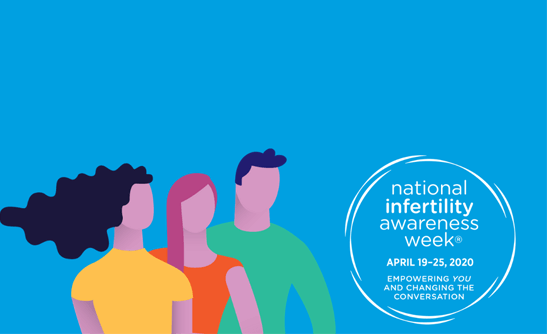
If you are on a fertility journey, you know that infertility can be an intensely personal subject. Many people feel shame or guilt if they are struggling with getting pregnant. There is no rational reason for these feelings, but part of the problem is that people are conditioned to keep their problems to themselves. If we were encouraged to share our struggles with others, the load might lighten just a bit. Making people more aware of this common issue is helpful in a number of ways. National Infertility Awareness Week is April 19-25, so we’re exploring why infertility awareness matters so much.
1. Not Everyone Knows What Infertility Really Is
Most people have heard about infertility, but how many know what that word actually means? Sure, they know that it means someone is struggling to conceive and carry a child. But infertility is not a catch-all term to describe general difficulty getting pregnant. Certain factors are involved in an infertility diagnosis.
The American Society for Reproductive Medicine (ASRM) defines infertility as “the result of a disease or disorder of the male or female reproductive tract which prevents the conception of a child or the ability to carry a pregnancy to delivery.” In order for the diagnosis of infertility to be made, a couple has to be unable to get pregnant after one year of having regular, unprotected sex. This timeline is cut down to 6 months if the woman is over 35 years old.
2. It’s More Common than People Think
Not everyone realizes that infertility is a common problem. That may be because it’s not something many people feel comfortable talking about. Most people probably know quite a few couples who are struggling with fertility, but they don’t know it because it’s not talked about.
According to data from the National Institute of Child Health and Human Development (NICHD), about 15% of couples are unable to get pregnant after having unprotected sex for one year.n After 2 years, 10% of couples still have not had a pregnancy carried to term.
Infertility awareness is important for this reason. People should not feel like they need to keep their struggles a secret. It is an intensely private matter, but being able to be open about it free from judgment or shame is extremely helpful for many people. Also, those on a fertility journey often feel comforted by knowing that they are not alone and that many people share their struggles.
3. Some People Think Infertility is Only a Female Problem
This is something that comes up over and over again. Some people think that when a couple struggles with fertility issues, the woman must be the infertile one. This piles guilt and shame onto women who are already going through a physically and emotionally trying experience.
We’ve talked about it before, but male factor infertility is an issue that’s involved in many cases of infertility. According to the CDC, in about 35% of couples with infertility, a male factor is involved along with a female factor. The NICHD says that about 9% of men and about 11% of women of reproductive age in the US have experienced fertility problems.
4. Anyone Can Face Challenges When Starting a Family
Infertility does not discriminate. People of all ethnicities, religions, and economic statuses can struggle with fertility problems. Nobody is immune. Fertility awareness efforts open people’s eyes to that fact and enable them to realize that they or someone they are close to could face that struggle. Personalizing something is a good way to get people on board to help with causes and be more understanding of other people’s struggles.
5. Infertility Awareness Can Remove Stigmas and Barriers
The more people there are that know the facts about infertility, the better it is for everyone. There should not be a stigma or shame about struggling with infertility. Infertility awareness is a critical part of normalizing conversation about fertility problems. That’s the first step in erasing stigma. Increasing awareness will also increase empathy and sympathy towards those dealing with such a personal problem. Opening up honest yet sensitive conversations will benefit everyone.
Raising awareness that this is such a common problem may also help knock down barriers to care that some people face. Some insurance plans cover fertility treatments, yet it is prohibitively expensive for many. By increasing awareness and educating people on this very real medical condition, changes can be made to the system so more people have access to care.
—
At Carolinas Fertility Institute, we are dedicated to helping you build your family with personalized care and attention. If you are struggling to get pregnant, we can help you come up with a plan that works for you. Call us at (336) 448-9100 to make an appointment in the Triad, or (844) 686-2233 for our Charlotte office.